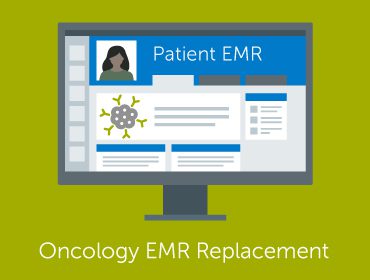
Nearly 40% of the population will be diagnosed with cancer in their lifetime. Currently, cancer diagnoses are rising – from 1.6 million new cases reported in 2020 to 1.9 million in 2022. The upswing is explained in part because of more sensitive screening tests. As the medical community continues to battle this disease that leads to one in every five deaths in the nation, technology tools play an important role in early detection as well as recording images and other clinical information.
Electronic medical record (EMR) consolidation in the oncology space is happening as some of the almost 7,000 oncology practices and cancer centers are acquired by larger health systems. As these large health enterprises already have investments in large EHRs like Epic and Oracle Cerner, there is a trend to integrate the cancer/oncology practices into the EHR leveraging their specialty modules.
Industry report ranks customer satisfaction with oncology EMRs.
In a recent KLAS report, 158 organizations noted their overall satisfaction with the large EHRs (Epic and Oracle) to accommodate oncology functionality. While some issues did require workarounds, the benefits of IT consolidation were highlighted as positives.
Elekta didn’t do as well, with survey respondents reporting a lack of new features and difficulty integrating with non-Elektra solutions. KLAS validated one live cloud deployment of Elekta’s MOSAIQ®, and several organizations are considering moving to the cloud. However, respondents not using or considering using the cloud report that Elekta has fallen behind in delivering new features, causing nearly one-third of interviewed customers to plan to leave. Nearly one-third of the group surveyed has plans to move on from MOSAIQ.
Oncology EMR system replacements call for plan for legacy records and image studies.
Whether an EMR change is due to an acquisition or to find a more suitable solution, there will be a continued focus on what to do with the important image studies and clinical records that are needed to support ongoing treatment over a long time period and meet record retention requirements. This is where an active archive like HealthData Archiver® supports seamless options to harmonize legacy data to keep historical records accessible, secure, interoperable and available for analytics.
Our team at Harmony Healthcare IT has experience with more than 550 unique clinical, financial, and administrative software brands used in healthcare delivery organizations – including Elekta MOSAIQ. If your oncology practice/clinic is acquired or you are changing your EMR, we can help preserve the legacy records including imaging studies.
DICOM Viewer for active archive supports long-term oncology needs.
Our Digital Imaging and Communications in Medicine (DICOM) Viewer is an available option with HealthData Archiver®that is integrated to ensure studies can be accessed in patient context. Single Sign-On from within Epic, Oracle, MEDITECH or others allows clinicians immediate access to review legacy studies from the go-forward EHR. The DICOM Viewer is especially helpful for oncology clinicians.
There are many benefits to HealthData Archiver®’s DICOM Viewer that include:
- Improved workflows
- Multiple image display options
- Links to DICOM studies
- Cost savings
For more information, check out these resources:
- Blog: Harmony Healthcare IT Launches DICOM Viewer for Medical Image Archival
- Brochure: DICOM Viewer
- Video: Introducing DICOM Viewer
Technological advancements are vital to continue the fight against cancer. As providers look at all available resources to gain an edge against the second leading cause of death in the nation, access to longitudinal records and images can support treatment options.
Looking ahead: Data management and interoperability will play an important role in cancer-related initiatives.
As those in health data management are focused on innovation, there are lofty nationwide goals on the horizon such as the Cancer Moonshot program that is facilitated by the White House.
Cancer Moonshot is a national initiative to end cancer as we know it. The programs goals are:
- Reduce the death rate from cancer by over 50% in the next 25 years.
- Improve the experience of patients and families living with and surviving cancer.
The Moonshot task force of leading experts in medicine – biology, immunology, genomics, diagnostics, cancer advocacy groups, pharmaceuticals, etc., outlined 10 recommendations aimed at accelerating progress in technology, encouraging collaboration and improving information sharing of key data. Technology advancements are noted as key contributors to three Moonshot goals and include:
- Create a network with direct patient engagement, where patients can share their information that leads to more precise knowledge about what treatment works, in whom, and in which types of cancer. This will also help triage some patients toward clinical trials that weren’t on the radar previously.
- Build a cancer data system that connects large datasets for researchers, clinicians, and patients.
- Build 3D tumor maps to help researchers understand how cells interact and tumors evolve from lesions to malignancy.
Cancer centers that are acquired or making EMR changes need a partner and a plan for legacy data, images and DICOM studies.
Standalone cancer and oncology clinics as well as those that are acquired by health systems will continue to need EHR options that suit their needs, which include being able to share information (interoperability) with other specialists and networks. A key part of moving forward is a plan for legacy records that must be retained and shared.
Our team is onboard to help you navigate these important EMR/EHR system moves.






